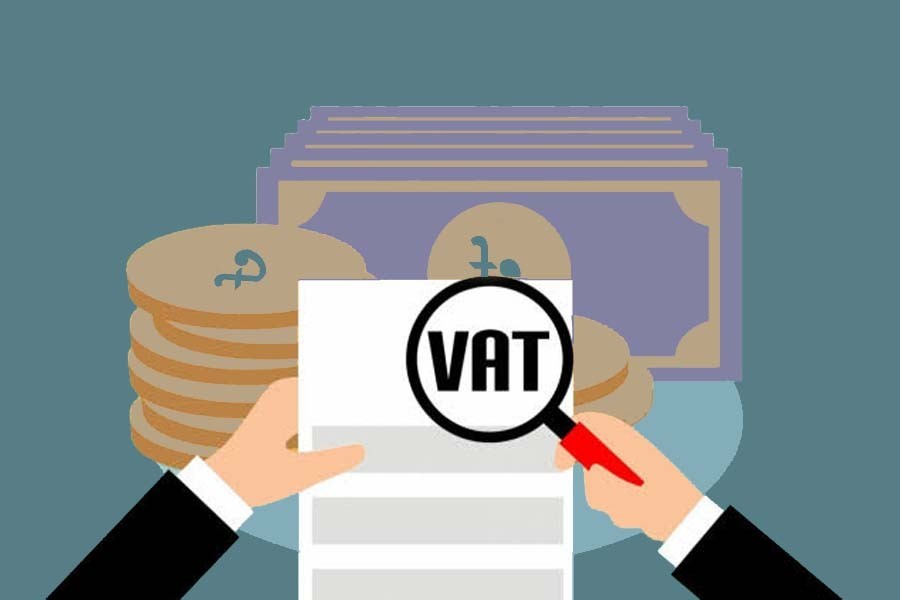Value-added tax (VAT) is an injustice for the poor in Bangladesh as they have to shoulder the burden of 12.1 per cent of the regressive tax on their income.
A study styled 'Aid to Pro-poor Domestic Revenue Mobilisation: The World Bank's Revenue Mobilisation Programme for Results in Bangladesh' revealed this on Wednesday.
According to the survey jointly conducted by SUPRO and Oxfam Bangladesh, the burden of VAT is only 5.9 per cent for the rich.
The poor have no idea that they are paying tax every day as there is VAT on mobile phone bill, medicine, gas, electricity and other essential services, it said.
The report of the study, conducted by SUPRO researcher Mohammad Shahid Ullah, was presented during a webinar styled 'Domestic revenue mobilisation in Bangladesh' attended by planning minister as the chief guest.
The aim of the study was to evaluate the WB-funded VAT Online Project.
However, the study report was prepared on June 18, 2019, before the implementation of the new VAT law and did not reflect many amendments to the original law.
The study was later reviewed by Dr Nasiruddin Ahmed, former chairman of the National Board of Revenue (NBR).
It alleged that the WB project would increase the existing tax burden on the poor people and increase dependency on indirect tax.
The report said the project was taken without proper assessment or feasibility study and stakeholders feared inflation that would harm poor consumers, and small and medium enterprises.
It recommended that the donors do not impose any policy reform as it should be open and transparent for stakeholders.
Poor people have no trust in the governance system which can materialise their rights and entitlements, the study observed.
It alleged that the paid VAT was not being properly deposited by businesses to the public exchequer.
"The incidence of indirect taxation on the poorest of the urban income groups is higher than that on the middle-income groups…"
The report also finds public expenditure is not pro-poor as public administration receives highest budgetary allocation of around 18 per cent.
Forty-one per cent of the safety net allocation is being spent for pensions of government employees.
The report claimed that some 71 per cent of the poor people are not covered by social safety-net programme. although they have to pay tax indirectly as VAT.
For efficient expenditure of the taxpayer's money, it says, the government needs to formulate pro-poor and inclusive budget with grater allocations for health, education, social security and agriculture sector.
The study suggested that the government restrict tax exemptions and conduct cost-benefit analysis of tax waiver, develop progressive tax system, frame wealth or property tax measures, develop data base through surveys, increase tax base, gender-friendly tax regime, withdrawal of VAT on essential items like mobile phone bill, SIM card, medicine and medicare items, address growing inequality through tax policy reform.
"The new VAT law was conditional with the International Monetary Fund (IMF) loan and developed without proper participation of stakeholders, and the WB project loan was provided without proper impact assessment of the new law," it cited.
According to the report, the NBR is yet to benefit from the VAT law as only 3.9 per cent of the VAT-registered business entities got the electronic fiscal device.
The study said only 2.74 per cent of total VAT came from retail and wholesale services despite their 11.39-per cent contribution to the gross domestic product.
Only 15-20 per cent of the due VAT is being collected from the retail and wholesale sector while the rest is dodged or evaded and it is highly visible in hotel and restaurant business.
Oxfam America senior researcher Marc Cohen and former NBR chairman Dr Ahmed delivered opening remarks while former Bangladesh Bank governor Dr Atiur Rahman was the key discussant.
Parliamentarian Aroma Dutta, Centre for Policy Dialogue senior research fellow Dr Towfiqul Islam Khan, NBR first secretary (VAT policy) Kazi Farid Uddin and former NBR chairman Dr Muhammad Abdul Mazid were the panellists.


